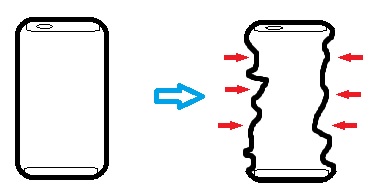3.9: Can Crush#
Consider a Can Crush experiment where an empty can is crushed using the pressure drop caused by instant cooling of the hot air trapped inside the can. An empty \(355\:ml\) can at atmospheric pressure is heated up to \(T=120^{\circ} C\) on a stove. Then can is then suddenly dipped upside-down into a bowl of water at \(T_w=25^{\circ} C\). Assumming the air inside the can is ideal gas in thermal equilibrium with the can, calculate:
a) mass of heated air inside the can
b) the crushing temperature for air inside the can assuming a pressure difference on \(P_c=20\:kPa\) is required to commence crushing

Solution Approach for a)#
based on ideal gas assumption,
\(PV=mRT\)
so
\(m=PV/(RT)\)
#define variables
P_a = 101325 #atmospheric pressure in Pa
R = 287 #gas constant in J/kg.K
T = 120 + 273.15 #temperature in K
P = P_a #initial hot air pressure in Pa
V = 355E-6 #gas container volume in m3
m = P * V / (R * T) #mass in kg
print('The amount of hot air stored in the can is:', f"{m*1000:.3f}", 'mg')
The amount of hot air stored in the can is: 0.319 mg
Solution Approach for b)#
The pressure difference (\(P_c\)) is the differece between the atmospheric pressure outside the can (\(P_a\)) and the pressure inside the can (\(P\))
\(P_c=P_a-P\)
so
\(P=P_a-P_c\)
then assuming idael gas for the air inside the can at this pressure
\(T=PV/(mR)\)
note the volume of the can is constant before the crush happens
P_c = 20E+3 #pressure difference in Pa
P = P_a - P_c
T = P * V / (m * R) #crushing temperature in K
print('The crushing temperature based on the pressure difference is:', f"{T-273.15:.1f}", 'C')
The crushing temperature based on the pressure difference is: 42.4 C
